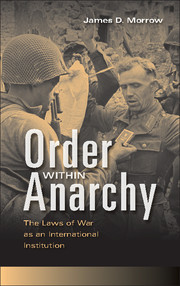Book contents
- Frontmatter
- Contents
- List of Tables
- List of Figures
- Acknowledgments
- 1 Introduction
- 2 Common Conjectures, Norms, and Identities
- 3 The Laws of War in Their Strategic Context
- 3′ Modeling Minutia
- 4 Patterns of Compliance with the Laws of War during the Twentieth Century
- 4′ Statistical Gore
- 5 Spoilt Darlings?
- 6 Assessing Variation across Issues
- 7 Dynamics of Common Conjectures
- 8 Conclusion
- References
- Index
2 - Common Conjectures, Norms, and Identities
Published online by Cambridge University Press: 05 July 2014
- Frontmatter
- Contents
- List of Tables
- List of Figures
- Acknowledgments
- 1 Introduction
- 2 Common Conjectures, Norms, and Identities
- 3 The Laws of War in Their Strategic Context
- 3′ Modeling Minutia
- 4 Patterns of Compliance with the Laws of War during the Twentieth Century
- 4′ Statistical Gore
- 5 Spoilt Darlings?
- 6 Assessing Variation across Issues
- 7 Dynamics of Common Conjectures
- 8 Conclusion
- References
- Index
Summary
Constructivism focuses on how shared understandings shape social life, giving predictability to it. Stable social orders require shared understandings when multiple stable configurations of behavior exist. In the language of game theory, the existence of multiple equilibria in a game representing a social setting means that many sets of strategies could be stable. Which equilibrium the actors play depends on the common conjecture they share. This chapter examines the concept of common conjecture to show how such shared understandings capture social norms and identities.
A common conjecture is how the actors understand and anticipate one another’s strategy and so know that their own strategy is what they should do. The common conjecture is specific to the equilibrium being played and coincides with the strategies the actors use in that equilibrium. Understanding the role of the common conjecture requires looking across multiple equilibria of a game to compare the shared understandings that the actors could hold in a stable social system. Because the common conjecture explains why the actors are playing one of a number of possible equilibria, its role can only be grasped by examining the content of different common conjectures of a single game. This variation in the actors’ strategic expectations can change the actions that they believe to be in their own best interest.
- Type
- Chapter
- Information
- Order within AnarchyThe Laws of War as an International Institution, pp. 23 - 57Publisher: Cambridge University PressPrint publication year: 2014



